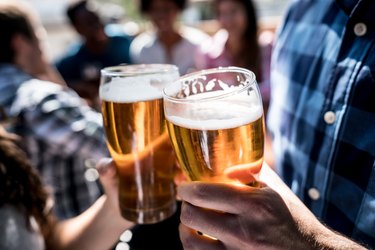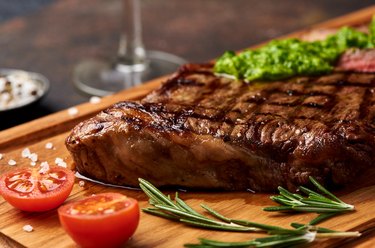
High cholesterol is a key risk factor for heart attack or stroke, according to the Centers for Disease Control and Prevention (CDC). A cholesterol blood test, which is also referred to as a fasting lipid panel, is used to measure this risk.
High cholesterol is often caused by unhealthy lifestyle choices, according to the American Heart Association (AHA). But genetics, age, medical conditions and certain medications can also play a role. And additional factors, like drinking alcohol, may also affect your blood test results.
Video of the Day
Video of the Day
Here's what you need to know about alcohol and cholesterol, along with other factors that affect cholesterol tests.
Read more: What Is the Recommended Daily Cholesterol Intake?
What Is Cholesterol?
Cholesterol is a waxy, fat-like substance. You may believe that cholesterol is inherently "bad" but the AHA explains that cholesterol is actually critical for your body to function properly. Cholesterol travels through the body in the form of particles called lipoproteins, according to Harvard Health Publishing. It can be helpful to know a bit more about the types of cholesterol in order to understand cholesterol blood test results.
Low-density lipoproteins (LDL) are the so-called "bad" cholesterol. If there is too much LDL in the blood, it can combine with other substances and create buildups in the arteries called plaque. Plaque makes the arteries narrower and more rigid, a condition called atherosclerosis, per the AHA. Atherosclerosis can lead to heart attack, stroke and cardiovascular disease.
High-density lipoproteins (HDL) are the "good" kind of cholesterol. They travel through the bloodstream and take excess LDL particles back to the liver, preventing plaque, according to Harvard Health Publishing.
Read more: The 9 Best Cholesterol-Lowering Foods
What Cholesterol Tests Measure
Typically, a fasting lipid panel will show a person's HDL, LDL, triglycerides and total cholesterol, according to the CDC. Triglycerides are a type of fat found in the bloodstream. High triglycerides raise your risk of heart disease, according to the Mayo Clinic.
There are several different ways to measure cholesterol levels, including the total amount of cholesterol in a person's blood. But the Mayo Clinic explains that many doctors now specifically test non-HDL cholesterol levels by subtracting the amount of "good" cholesterol from everything else. This test gives clinicians a better understanding of a person's risk of heart attack or stroke.
Why? Because, in some cases, a person can have elevated HDL levels and therefore high cholesterol overall. But since HDL is "good" cholesterol, having high HDL is not generally a concern.

Factors That Affect Cholesterol
Here are some of the causes of high cholesterol:
1. Diet
The liver produces almost all of the body's cholesterol, per Harvard Health Publishing. Cholesterol can also come from food, called dietary cholesterol. Until recently, it was believed that dietary cholesterol played a significant role in causing high cholesterol. But research now shows that fats (particularly saturated fats) and carbohydrates play a much more significant role, as described by a major 2015 report by the USDA Dietary Guidelines Advisory Committee.
So, while avoiding dietary cholesterol may not be necessary to keep your cholesterol levels in check, most cholesterol-rich foods also have lots of saturated fats, says Robert H. Eckel, MD, professor of medicine emeritus at the University of Colorado, Anschutz Medical Campus, former president of the American Heart Association and president of the American Diabetes Association.
"Meats, dairy and baked goods like cakes and doughnuts all have lots of saturated fats. Saturated fats raise LDL for everyone," Dr. Eckel says. Eggs are the exception. Dr. Eckel explains that while eggs, namely the yolks, have a lot of cholesterol, they don't have saturated fat.
Sugar can also lead to elevated triglycerides, per the Mayo Clinic.
Though dietary cholesterol may have a less-significant impact on your overall health, food can still raise cholesterol levels temporarily. This is why most cholesterol tests require you to fast for nine to 12 hours before your test, according to the Mayo Clinic. Be sure to discuss preparing for your test with your doctor.
Read more: Foods to Avoid Before Having a Blood Test
Can You Drink Water Before a Blood Test?
Yes. Drinking water during the fasting period before your lipid panel test will not affect your results.
2. Smoking and Alcohol
Smoking cigarettes increases plaque buildup, according to the CDC. It also lowers HDL levels, meaning the body has less good cholesterol to prevent plaque. Smoking damages blood vessels and raises the risk of blood clots — which can later cause a heart attack or stroke. Quitting smoking is one of the best things you can do to improve your cholesterol and your overall health.
Here's what you need to know about alcohol and cholesterol: The body breaks down alcohol through digestion and the liver then reassembles it as cholesterol and triglycerides, another type of fat, according to Heart UK. Therefore, alcohol consumption can raise cholesterol and triglycerides levels.
Can You Drink Alcohol Before a Blood Test?
If you're instructed to fast before a cholesterol test, you'll want to abstain from alcohol during that time so it does not affect your test results.
3. Weight
Obesity is a significant risk factor of high cholesterol, per the AHA. But there's good news: Managing your weight can improve your cholesterol test result. "Active weight reduction [causes] cholesterol levels to fall," says Dr. Eckel.
Achieving and maintaining a healthy weight through exercise and good food choices is one of the most important ways to reduce your risk of heart attack, stroke or cardiovascular disease, per the AHA.
4. Medical conditions
A number of serious medical conditions can affect cholesterol levels and tests. "Major end organ diseases, including kidney disease, advanced liver disease and thyroid disease can cause problems [when] assessing cholesterol levels," Dr. Eckel says.
5. Medications
Certain medications can affect cholesterol tests. The goal of cholesterol medication, is, of course, to reduce cholesterol levels. If the medication is working, cholesterol tests will be lower.
Dr. Eckel says that women who are taking estrogen-replacement hormones to treat menopausal symptoms also may see elevated HDL levels. But, since it's HDL and not LDL, estrogen therapy-related high cholesterol is not generally a concern.
Be sure to discuss all your medications with your doctor before your cholesterol test.
- Centers for Disease Control and Prevention: "Cholesterol Myths and Facts"
- American Heart Association: "Causes of High Cholesterol"
- American Heart Association: "Control Your Cholesterol"
- Harvard Health Publishing: "How It’s Made: Cholesterol Production in Your Body"
- Mayo Clinic: "Cholesterol Ratio or Non-HDL Cholesterol: Which is Most Important?"
- USDA: "Scientific Report of the 2015 Dietary Guidelines Advisory Committee"
- Mayo Clinic: "Cholesterol Test"
- Centers for Disease Control and Prevention: "Smoking and Heart Disease and Stroke"
- Heart UK: "Alcohol"
- Centers for Disease Control and Prevention: "Getting Your Cholesterol Checked"
- Mayo Clinic: "Triglycerides: Why Do They Matter?"
Is this an emergency? If you are experiencing serious medical symptoms, please see the National Library of Medicine’s list of signs you need emergency medical attention or call 911.